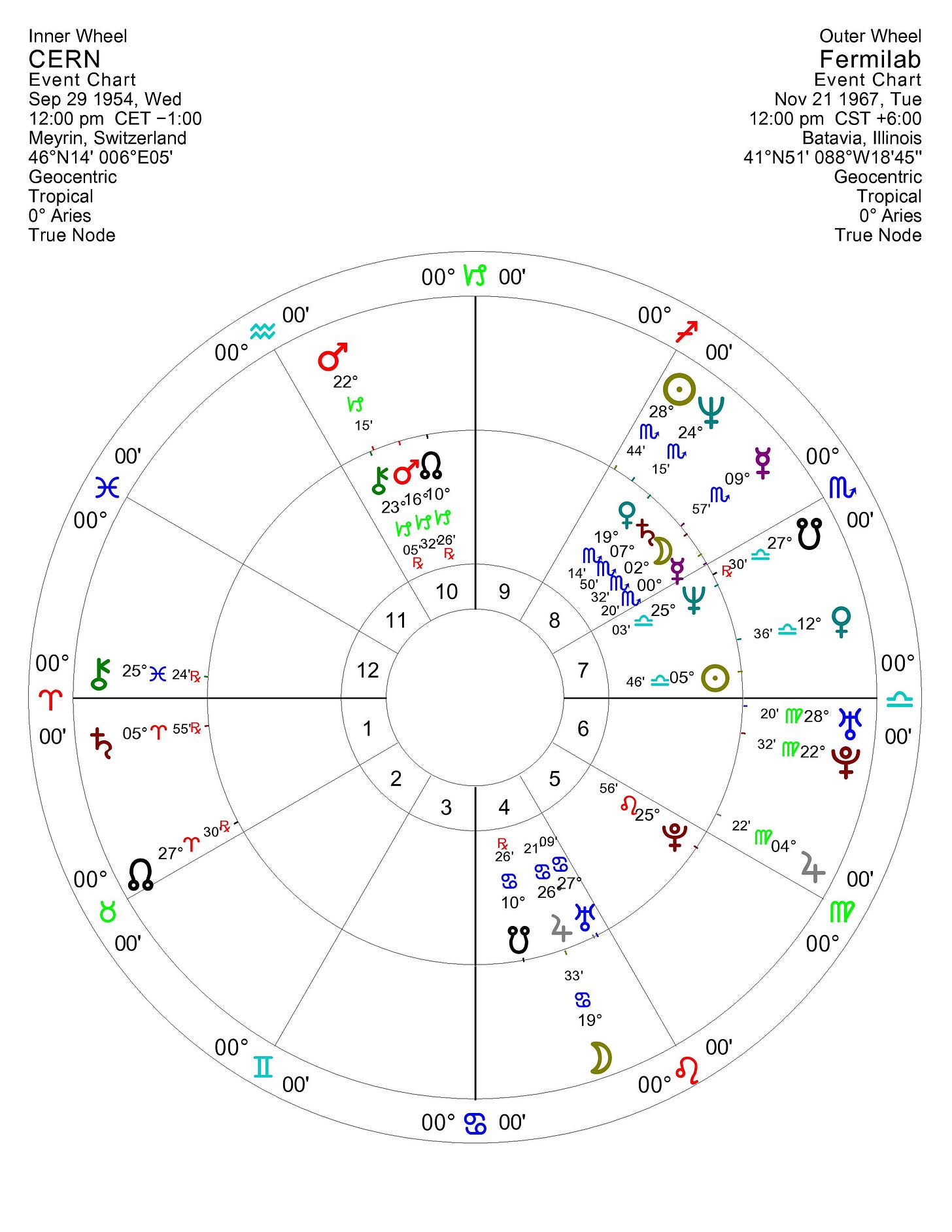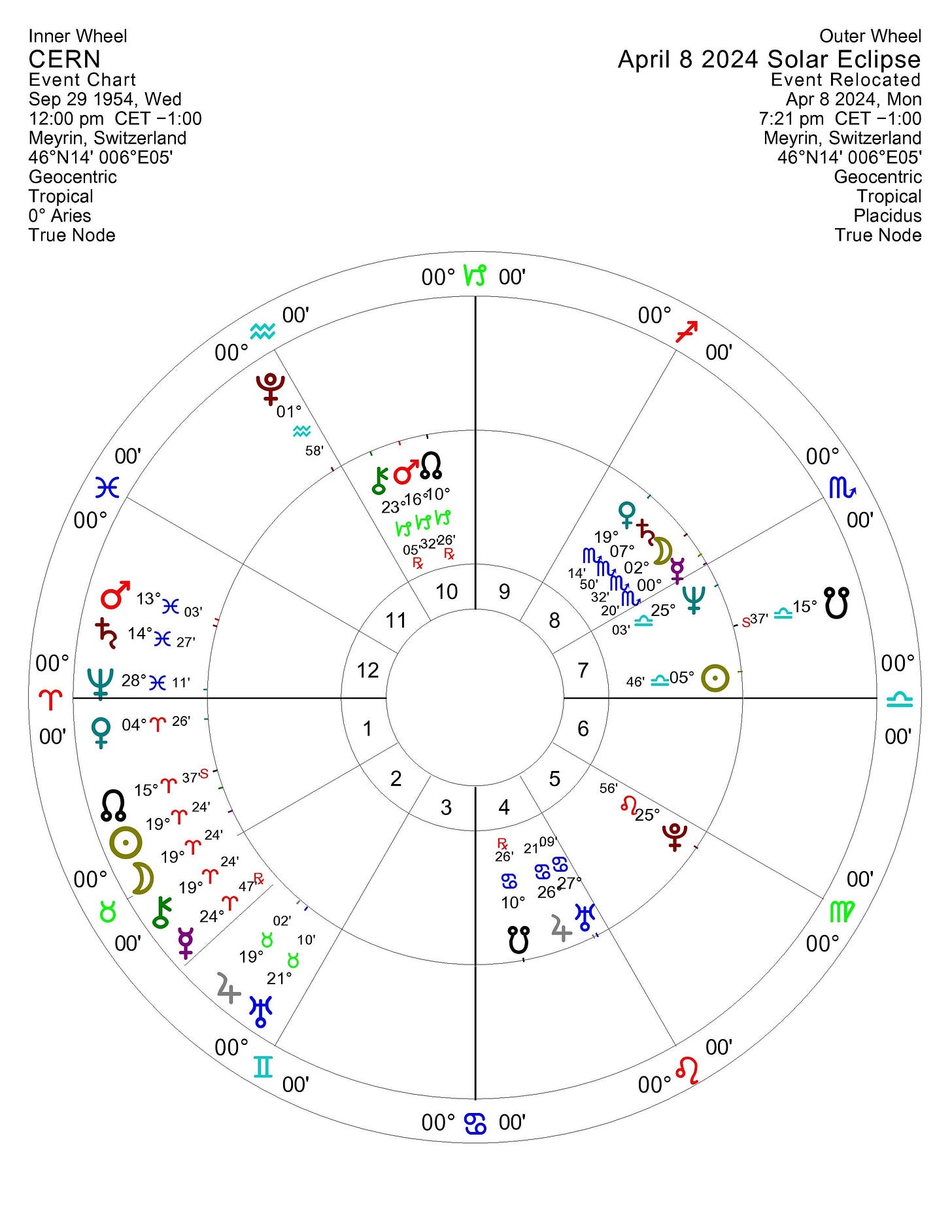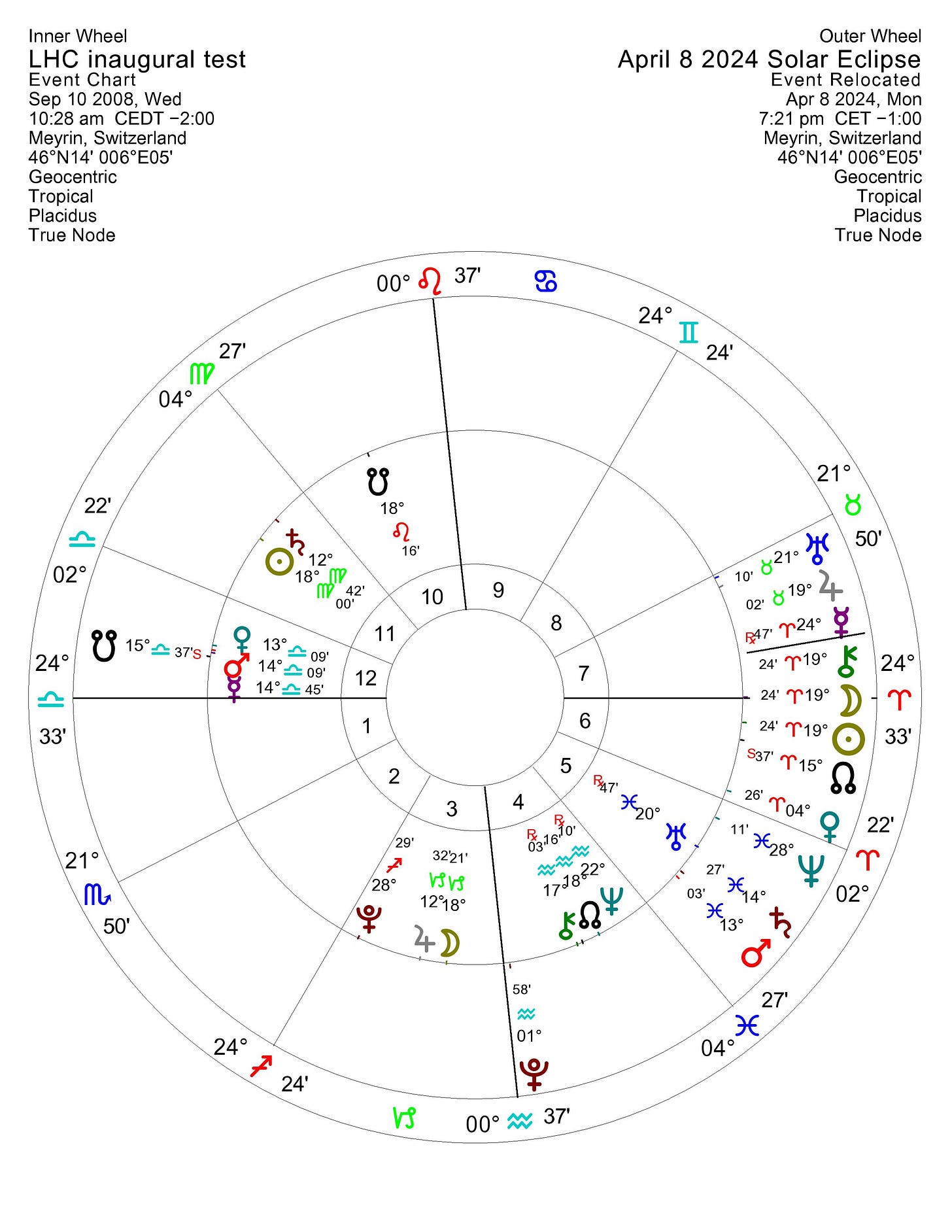Weekend Entertainment Guide: Anticipating the April 8 Solar Eclipse
Includes an astrological look at the rumors about CERN and the Solar Eclipse
Whatever happens at the April 8 Solar Eclipse, April 9 is only four days away. I hope some people will be able to survive the letdown. In this edition of the Weekend Entertainment Guide, I provide links to online resources regarding the much-hyped Solar Eclipse as well as my own analysis of claims involving CERN and the Solar Eclipse.
Solar Eclipse live streams and other free online events
At 10 am PDT on Saturday, April 6, Kepler College faculty member Brandon Hansen will give a presentation about the Solar Eclipse. Register here.
During the Solar Eclipse on April 8, Kepler College will host a live stream with footage of the Solar Eclipse from different locations. Information here.
Astrology Hub’s series of free events will conclude with a group meditation during the Solar Eclipse on April 8. Register here.
Timeanddate.com will provide a live stream of the Solar Eclipse on April 8.
Online resources
Atlas Obscura provides images of fashionable eclipse glasses used in the early 20th century.
Atlas Obscura also reports on how people have been having unwarranted freakouts about Solar Eclipses for centuries: “Even more recently, an eclipse in 1878 prompted fears of Armageddon in the United States, with many people believing it was the second coming of Jesus and therefore Judgment Day. One man went home, killed his family with an ax, and killed himself for fear of what would happen.” Don’t be that guy.
Timeanddate.com provides viewing information for the Solar Eclipse. Even if you are not in the path of totality, you may be able to see some of the eclipse.
The Solar Eclipse falls at the very end of the decan of Aries II. Solar Simone covers that decan for The Astrologers' Co-Op: Journey through the Decans, providing a case study of Celine Dion (Sun, Midheaven, Saturn and North Node in Aries II).
Meanwhile, Mercury is also retrograde. Gary P. Caton covers the current Mercury Retrograde for Astrologers' Co-Op.
Concerning CERN and the Solar Eclipse
Jim Staley provides an especially elaborate example of the unnecessary fearmongering regarding the Solar Eclipse that I have been complaining about lately. Among other things, he claims that CERN will be starting up its Large Hadron Collider during the Solar Eclipse on April 8 and attempting to produce the God particle, which could have destructive consequences.
As an astrologer, my first step toward checking the validity of the concerns about CERN is to look up the date of CERN’s establishment. According to Wikipedia, CERN, which is short for the European Organization for Nuclear Research, was founded on September 29, 1954. That gives it the Sun early in Libra, where the Lunar Eclipse took place last month — and that could explain why CERN is suddenly getting noticed.
There was another big round of fearmongering about CERN when the Large Hadron Collider’s Run 3 began on July 5, 2022. At that time, transiting Jupiter in Aries was opposing CERN’s Libra Sun. That was one weird news week — in addition to the CERN hysteria, the Georgia Guidestones mysteriously blew up, and Shinzo Abe was assassinated — but we are still here.
CERN was established with a Jupiter-Uranus conjunction in Cancer. There is currently a transiting Jupiter-Uranus conjunction in Taurus. People or things born with a configuration between two planets often become prominent at subsequent configurations between the same two planets. This phenomenon is repeatedly explored in Cosmos and Psyche by Richard Tarnas.
It is therefore understandable that we are at least hearing about CERN again. A Jupiter-Uranus conjunction always tends to be volatile and unpredictable, whether it is in a natal chart or in the ongoing planetary transits. However, the transiting Jupiter-Uranus conjunction in Taurus is sextile CERN’s natal Jupiter-Uranus conjunction in Cancer, and I would think that that sextile sounds like a stabilizing influence — one that helps CERN channel its work in a direction that’s productive rather than pointlessly chaotic.
The Large Hadron Collider is not the only particle accelerator in the world. The United States has particle accelerators at various sites including Fermilab in Batavia, Illinois. When I was in college and not yet familiar with astrology, I was interested in becoming a science journalist. During summer 2006, I had an internship in the communications department at Argonne National Laboratory also in Illinois. The Argonne interns were taken on a group tour of Fermilab, so I have been there, and I didn’t see anything I found disturbing.
Jupiter-Uranus conjunctions repeat every 14 years. Per Wikipedia, Fermilab is 13 years younger than CERN, so it’s not quite all the way to the next Jupiter-Uranus conjunction. However, Fermilab at least has Jupiter and Uranus co-present in Virgo, at opposite ends of the sign. More saliently, Fermilab has Uranus conjunct Pluto in Virgo.
The synastry between CERN and Fermilab is interesting. Unfortunately, both of these charts are untimed. However, it’s clear that both entities have a lot of Scorpio in their natal charts. Both also have Mars in Capricorn.
Back to the upcoming Solar Eclipse, that’s actually less intense for CERN than the Lunar Eclipse that already recently happened. CERN always has that uncomfortable Mars-Chiron conjunction in Capricorn, and the Solar Eclipse conjunct Chiron in Aries will be square to that. However, the transiting Mars-Saturn conjunction in Pisces should have a stabilizing influence on all the Water and Earth energy in CERN’s chart, including the Mars-Chiron conjunction.
The Large Hadron Collider itself has a Moon-Jupiter conjunction in Capricorn trine a Sun-Saturn conjunction in Virgo — its time of first operation is known. Currently, the transiting Jupiter-Uranus conjunction in Taurus and Mars-Saturn conjunction in Pisces form a kite configuration with all of that. The LHC also has a Libra stellium opposed by the Aries Solar Eclipse, which is potentially tense, but the Water and Earth alignments should provide balance.
In conclusion, there are astrologically understandable reasons why CERN is catching the public’s attention now, but I am not personally worried about CERN’s current activities. On its website, CERN reports that the Large Hadron Collider achieved stable beams at 6:25 pm local time today, April 5, “marking the official start of the 2024 physics data-taking season.” It sounds like whatever is going to happen there is already happening.







